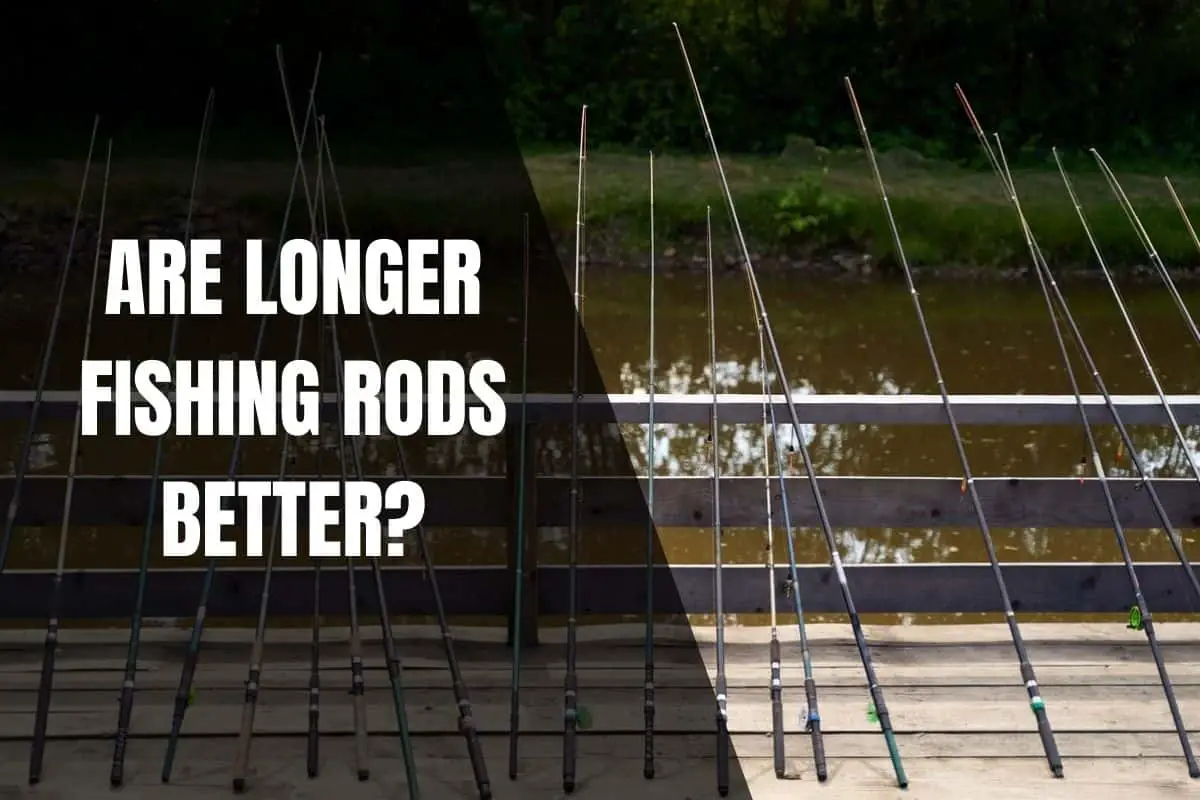Spend any time at a local fishing spot, and you’ll find no shortage of anglers who are happy to volunteer their thoughts on the perfect fishing rod. Some swear by a long rod, while others prefer something shorter. As someone new to the world of fishing, how can you make sense of it all and find the ideal fishing rod length for you?
The length of your fishing rod can affect your casting accuracy, distance, and leverage. Shorter rods less than 6 ft are great when you need to do short and accurate casting. Longer rods greater than 7.5 ft are great for long-distance casting. Rods between 6 ft to 7.5ft are excellent and versatile rods suitable for different types of fishing.
But the most crucial factor when it comes to the best fishing rod length is primarily a matter of personal preference and the type of fishing you’re doing. There are instances where a shorter or longer rod is best. Most of the time, anglers prefer a length somewhere between long and short rods.
Read on as we cover everything you’ll need to know to select the right rod size for the way you fish. We’ll also discuss all the different use cases when a shorter or longer rod may be better for you.

Does Fishing Rod Length Matter?
Many new anglers have the first question – “does it matter what fishing rod you use?”
The answer is a resounding yes, although how much it matters depends mainly on the type of fishing you’re doing.
Here is a breakdown of what is classified as short, medium, and long rod lengths.
| Fishing Rod Length Classification | Rod Length Range | Typical Fishing Applications |
|---|---|---|
| Short | Less than 6′ | Casting, Ice Fishing, Starter length for children |
| Medium | Between 6′ to 7′-6″ | Casting, Bottom Fishing, Jigging, Surf Fishing, Live Bait Fishing, Bobber Fishing, Pier Fishing, Fly Fishing |
| Long | Longer than 7′-6″ | Surf Fishing, Trolling, Fly Fishing, Casting |
Rod Length Characteristics
The length of your fishing rod will affect three different aspects of fishing: your casting accuracy, casting distance, and leverage.
Casting Accuracy
If you’re looking for a rod that offers great casting accuracy, you would want a short rod. Shorter fishing rods are lighter and easier to control, allowing you to focus on the casting technique.
You want better accuracy if you’re casting in certain spots or trying to avoid certain areas.
As you move up in rod length, you will find it harder to maintain the same level of casting accuracy. However, with practice, you can still maintain a good level of accuracy when casting using longer rods. It will just be longer.
Recommendation: If you’re just starting off, I would recommend you use a fishing rod in the smaller range of a medium-length fishing rod. Somewhere in the 6′ to 6′-6″ mark.
Casting Distance
If you’re looking to cast your line to the moon, you will be looking at a long rod. The longer the fishing rod, the easier it is to cast far. Longer rods will give your line an excellent whipping action when you cast, which helps with casting distance.
Also, the longer length acts as a leaver, which amplifies the force you apply to the rod when casting. Generally speaking, when you are trying to get the longest cast, casting accuracy does not matter a lot. It’s all about the power.
Recommendation: If you’re interested in surf fishing or casting off a pier, I would recommend you not to go extremely long for your first rod. As you get more experience and practice then you can move up to longer fishing rods. I recommend you start in the lower end of the longer rod classifications, somewhere between 7′-6″ to 8′-6″ should be a good start.
Leverage
Leverage can mean many different things, depending on the situation. It could refer to the amount of casting power you’ve applied, the force of the hook set, or the force you’ve used to pull up on the rod as you try to bring up the fish.
Regardless of the situation, the longer the rod, the more leverage you will have. However, leverage can be a two-way street, meaning that a small 5 lb fish can feel like you’re fighting a 10 lb fish.
You want more leverage if you’re bottom fishing or doing a lot of casting. But depending on the situation, there could be other factors why you don’t want a crazy long rod.
Recommendation: If you are looking to cast as far as possible then refer to the section above. If you’re looking for more leverage in regards to increasing the power you apply to your hooksets, or just to be able to have more leaverage when fighting a fish then I recommend a rod length in the medium length category.
How to Determine Fishing Rod Length For You
When shopping for your fishing rod, you should first evaluate the type of fishing you’ll be doing.
Understanding what type of fishing you will be doing will influence your decision on what rod length you will need. Here is a rough list of different styles of fishing that you might be doing with a recommended rod length for beginners.
| Fishing Styles | Recommended Rod Lengths |
|---|---|
| Casting | 7′ to 8′ |
| Bottom Fishing | 6′ to 7′-6″ |
| Jigging | 6′ to 7′-6″ |
| Pier Fishing | 6′ to 7′-6″ |
| Boat Fishing | 6′ to 7′-6″ |
| Live Baiting Fishing | 6′ to 7′-6″ |
| Bobber Style Fishing | 6′ to 7′-6″ |
| Trolling | 8′ to 9′ |
| Surf Fishing | 10′ to 12′ |
| Fly Fishing | 8′ to 9′ |
| Ice Fishing | 2’6″ to 4′-6″ |
The majority of fishing rods are between 6′ to 7’-6″ long. These rods are the most versatile type of fishing rod and can be used in many different types of fishing, whether you’re fishing freshwater or saltwater, from a boat, a dock, or the shore.
FAQ
What difference does fishing rod length make?
Rod length plays a significant role in how the rod performs. Longer rods allow you to cast further, making it easier to set the hook when a fish takes your bait. However, longer rods can be a challenge to use depending on your surroundings, and they make it more challenging to fight larger fish.
Happy Fishing & Tight Lines

